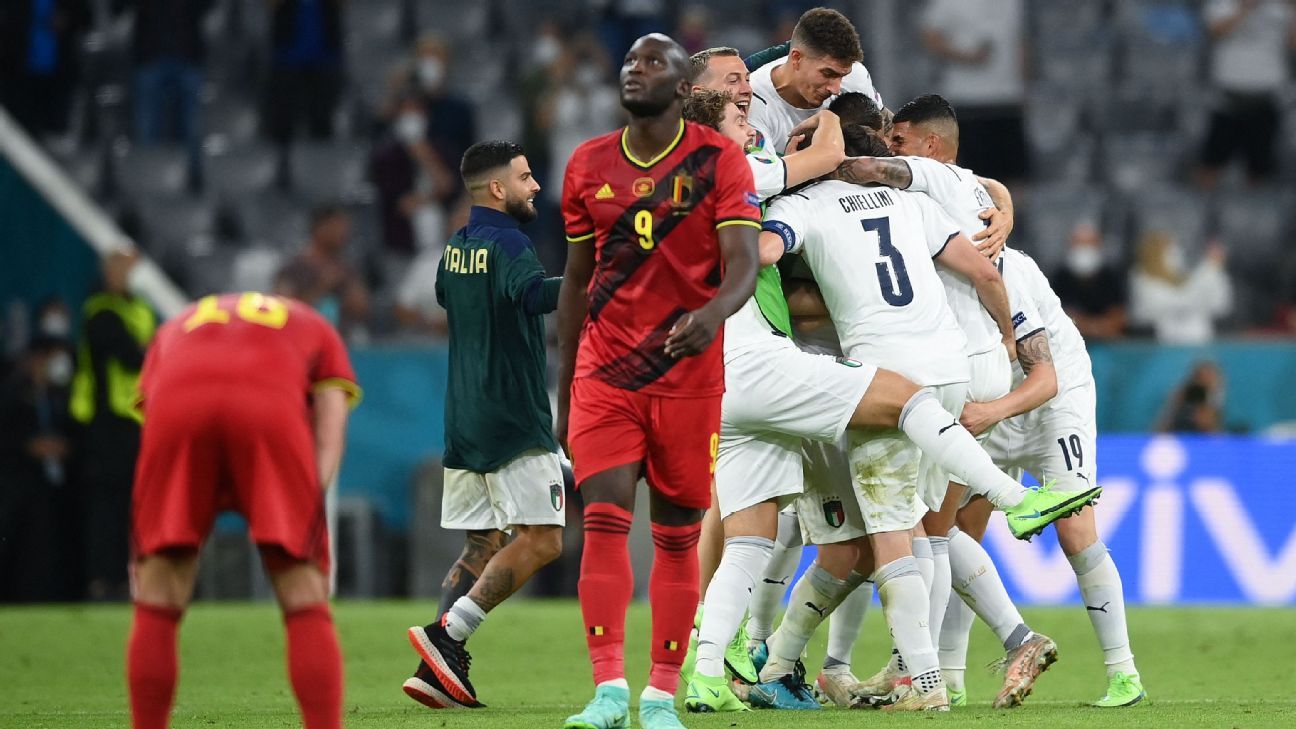So here we are. Final four time at Euro 2020. Two teams enter, one team leaves, in the Wembley Thunderdome. (OK, then another two teams enter, one of them leaves, and the two remaining teams face off on Sunday for all the marbles… I like the third Mad Max; sue me.)
There’s something about one-off knockout rounds that just works. UEFA realized this last year when, due to the coronavirus pandemic, the Champions League quarterfinals were turned into single-leg affairs. That’s also why they’re considering scrapping two-legged semifinals and going with a final four format in one location.
– Euro 2020 on ESPN: Stream LIVE games, replays (U.S.)
– European Soccer Pick ‘Em: Compete to win $10,000
– Euro 2020 bracket and fixture schedule
We’re seeing it at Euro 2020. The vast majority of the knockout games have been engrossing, partly for the stakes involved, partly because there are no second chances. And, conversely, each game is a stand-alone. That matters, because if there is a pattern to this Euro, it may well be that each match is its own story, largely disconnected from the previous one (or the next one).
If a 38-game season represents a book with 38 chapters, this is a collection of episodic short stories: same protagonists, but not necessarily different themes and often different plots.
Consider the four semifinalists. We may like to draw a thread between each of the five games they’ve played thus far, but it’s going to be a far more disjointed one than any five-game sequence for a club side in a regular season, at least in terms of the emotional response from players or fans.
– Gab and Juls podcast: Previewing Euro 2020 semifinals
Denmark obviously struggled with the massive trauma of Christian Eriksen‘s collapse in the opening game, and then found themselves on zero points after the first two games. They proceeded to thump Russia (in a game that, for long stretches, was closer than the 4-1 scoreline suggests) and qualify for the round of 16, romped past Wales 4-0 and then squeezed past the Czechs in the quarterfinal.
The takeaway from each game, in many ways, was different. Eriksen overshadowed everything, rightly, in the first match. The second game was grim, the third was a roller coaster (owing also to results in the other game), the fourth was a romp, and the fifth was in doubt until the final whistle.
How about England? Praised after the opening win against Croatia, we had doom-and-gloom after the draw with Scotland, dejection for the 0.00 xG in the second half despite the win over the Czechs, elation for finally beating Germany, and then absolute ecstasy after thrashing Ukraine.
Spain? In some respects, it’s been even worse. Two draws in the opening two games, after dominating possession and squandering chances and penalties, left some questioning their character. Then, a 5-0 stomping of Slovakia, a reminder that, yeah, they’re talented, and passing and patience get rewarded. This was followed by the incredible ride against Croatia: from 0-1 down, to 3-1 up, to 3-3 (with two goals conceded after the 85th minute), to 5-3. All in one game. And then, to get to the semifinal, a comparative snoozefest against Switzerland, who were down to 10 men for 48 minutes, which they resolved on penalties. How do you even begin to assess where they are after a whirlwind like that?
Italy have arguably been the most consistent at least in terms of results and reactions. But after running the table in the group stage and dominating the first half against Austria, they suffered mightily, conceding chances, getting VAR help and then, eventually, coming through in extra time. That was followed by possibly their best performance of the tournament against Belgium, but even then, they came within a Leonardo Spinazzola thigh and a Gigio Donnarumma glove of conceding the equalizer.
Club football has its merits, but it doesn’t do that to you. The emotional connection we may feel with our clubs is just as strong — and often stronger — but it’s a slower, more intense connection. It’s maybe a more painful one, too: After all, to some degree, we choose our clubs, but we don’t choose our national teams. (Well, most don’t.)
But there is nothing like the compressed, no-tomorrow emotional swing of an international knockout tournament, whether it’s the Euros, the World Cup or the Copa America. Maybe it’s not just the format. Maybe it’s the three-year gap since the last one that makes it more special, or the fact that we’re seeing fans in the stands (in fact, nearly full stadiums, in some cases). Or maybe it’s the fact that in much of Europe, this comes just as we’re turning the page on one of the bleakest periods of our recent history.
Whatever the case, this is special and hard to replicate. There are three games to go. Enjoy it.
